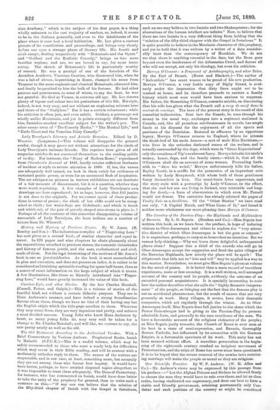The Country of the Passion-Play : the Highlands and Highlanders
of Bavaria. By L. G. Seguin. (Strahan and Co.)—Miss Seguin has written this book, as we learn from the preface, in hope of inducing visitors to Ober-Ammergau and others to explore the " very attrac- tive district of which Ober-Ammergau is but the gate or outpost." It is ungracious, perhaps, to carp at so benevolent an intention. But we cannot help thinking,—Why not leave these delightful, unfrequented places alone ? Suppose that a third of the crowds who will go to Ober-Ammergau accept the suggestion and flood the quiet villages of the Bavarian Highlands, how utterly the place will be spoilt ! The old proverb that bids not to " kiss and tell " may be applied in a way to this matter. Nevertheless, we must give Miss Seguin's pleasant volume its due meed of praise. It is better than a mere record of travellers experiences, more or less amusing. It is a well-written, well-arranged account of the country and its people, evidently the outcome of an extended personal acquaintance. It is specially interesting to note how the author describes what she calls the " highly dramatic tempera- ment" of the people, so bringing out the fact that the famous play is not an accidental phenomenon, but the result of causes that are very generally at work. Many villages, it seems, have their dramatic companies, which act regularly through the winter. As to Ober Animergau itself, Miss Seguin does full justice to the share which the Pastor Daisenberger had in giving to the Passion-Play its present admirable form, and generally to the rare excellence of the man. We have a favourable account of the religious character of the people; as Miss Seguin justly 'remarks, the Church of Rome is ever seen at its best in a state of semi-repression, and Bavaria, thoroughly Roman Catholic, but influenced by its connection with the German Empire, is a favourable specimen of its work. This unity has not been secured without effort. A merciless persecution in the begin- ning of the eighteenth century crushed an incipient movement of Protestantism, and the reign of Rome has never since been questioned- It is to be hoped that the recent removal of the unwise laws restrict- ing marriage will make the people as moral as they are religious.


































 Previous page
Previous page